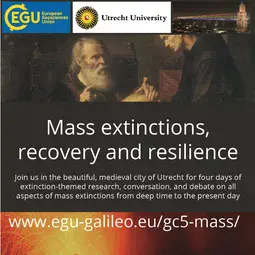EGU Galileo Conference: Mass extinctions, recovery and resilience
24 January 2019
The first EGU Galileo Conference of 2019 will examine all aspects of mass extinctions from deep time to the present day. It will take place on 28–31 August 2019 at Utrecht University in the Netherlands. The deadline for abstract submission is 30 April 2019.
Earth faces unprecedented challenges from anthropogenically induced environmental change and there are growing concerns that we are now living through Earth’s 6th mass extinction. Understanding the cause(s) of the previous five mass extinctions and other biotic crises, and the nature of ecosystem recovery and resilience to change, has never been more timely. In this context, the 5th EGU Galileo Conference: ‘Mass extinctions, recovery and resilience’ will bring together researchers in palaeontology, volcanology, geochemistry, atmospheric science, climate modelling and geobiology to interact and share their latest findings, providing synergies for future research.
The conference will take place over three days at Utrecht University and will be followed by a day field trip to Cretaceous-Paleogene exposures near Maastricht. The meeting format allows time for keynote lectures, poster sessions, and plenty of discussion time which will help stimulate new collaborations and research. Contributions from early career scientists are especially welcomed.
Geoscientists interested in presenting at the meeting can submit their abstracts until 30 April. Registration is open until 30 June 2019. Additional information about the meeting, including registration rates and accommodation information, is available on the conference website.
EGU Galileo Conferences address well-focused, cutting-edge topics at the frontier of geosciences research. They are named in honour of Galileo Galilei and have been taking place since 2017.
Contact
David P.G. Bond
University of Hull, UK
Email d.bond@hull.ac.uk
Bas van de Schootbrugge
Utrecht University, Netherlands
Email B.vanderSchootbrugge@uu.nl

